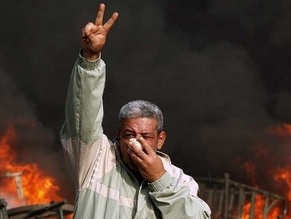|
World Jewish News

A protester gestures in front of a burning barricade during a demonstration in Cairo January 28, 2011. Photo by: Reuters
|
Fourth day of mass riots across Egypt; top reformer put under house arrest
28.01.2011, Israel and the World Egyptian security officials say police have put pro-democracy leader Mohamed ElBaradei under house arrest. Police stationed outside his suburban Cairo home told him he cannot leave the house after he joined tens of thousands of protesters in the capital Friday.
Earlier on Friday, Police used water cannons against ElBaradei and his supporters as they joined the latest wave of anti-government protests after Friday noon prayers.
Egypt is witnessing its fourth day of riots and unrest as angry protesters take to the streets calling for the ousting of President Hosni Mubarak, who has ruled the country for nearly 30 years.
At least five have been killed in clashes between protesters and security forces so far, and some news agencies are reporting that one protester has thus far been killed in Friday's clashes.
Poice used batons to beat some of ElBaradei's supporters, who surrounded him to protect him.
A soaking wet ElBaradei was trapped inside a mosque while hundreds of riot police laid siege to it, firing tear gas in the streets around so no one could leave. Tear gas canisters set several cars ablaze outside the mosque and several people fainted and suffered burns.
Groups of thousands of protesters, some chanting "Out! Out! Out!" gathered in at least six venues in Cairo, a city of about 18 million people. Many marched toward major squares and across Nile bridges, setting off clashes with police. Security officials said there were protests in at least 11 of the country's 28 provinces.
Security officials said protesters ransacked the headquarters of Mubarak's ruling party in the cities of Mansoura north of Cairo and Suez, east of the capital.
Earlier in the week, a call for a big protest on Friday gathered 24,000 Facebook supporters within hours of being posted.
Internet and cell phone services were cut off early Friday in Cairo and remained down in an extreme but inadequate attempt to stop protesters organizing. Facebook, Twitter and Blackberry Messenger also saw interruptions.
United Nations Secretary General Ban Ki-moon criticized the government for taking down the country's communication networks and internet service ahead of the planned protests.
"One of the ground principles of democracy is to protect freedom of speech," Ban said, while speaking on the sidelines of the World Economic Forum in Davos, Switzerland. "Freedom of expression should be fully respected."
On Thursday, U.S. President Barack Obama said violence was not the answer in the Egypt. The White House has expressed that they are not taking sides in the country's unrest.
Mubarak has not been seen publicly or heard from since the protests began Tuesday. He and his government have shown no hint of concessions to the protesters who want political reform and a solution to rampant poverty, unemployment and rising food prices.
The protests in Egypt follow the overthrow two weeks ago of another long-serving Arab strongman, Tunisian leader Zine al-Abidine Ben Ali, in a popular revolt.
Analysts said the U.S. probably wants to avoid adding to political uncertainty by abandoning Mubarak. Egypt's peaceful relationship with Israel is a bulwark of stability in the unsettled region.
A presidential election is due in September. Egyptians assume that the 82-year-old Mubarak plans either to remain in control or hand power to his son Gamal, 47. Father and son both deny that Gamal is being groomed for the job.
Haaretz.com
|
|
